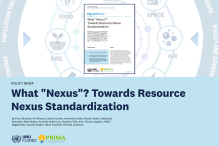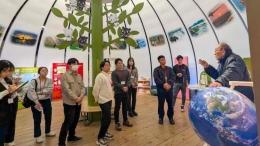First published by OPEC Fund on 1 January 2024
In an interview with the OPEC Fund, Fatima Denton, Director of the United Nations University Institute for Natural Resources in Africa (UNU-INRA) in Ghana, gives concrete examples of African leadership, while stressing the need to scale-up efforts by grassroots.
“Africa is the only continent that has a regional body that is solely looking at aspects of climate change: the Committee of African Heads of State and Government on Climate Change (CAHOSCC).
“The committee meets regularly and is a very good example of leadership, but it could be more pro-active and coordinated on the global stage. Take green minerals, for example. To scale-up renewable energy, we know we’ll need more copper and cobalt, so Africa should have a joint strategy, talk with one voice, and negotiate as a bloc.
“Turning to grassroots level, there are many climate-smart, high-potential initiatives across the continent. My organization, UNU-INRA, has been looking at the informal sector because in some African countries 80 percent of jobs are in the informal sector. We think it’s far too important to be left out of the international climate equation, so we’ve set up a digital platform – the Just Energy Transition in the Informal Sector (JUSTIS) – to help informal groups bring gree goods from production to delivery to commercialization. It aims to bring together all major stakeholders: from entrepreneurs to investors to government officials to potential consumers.
“Another problem is making sure our global goals align. At UNU-INRA we’ve been working with the government of Ghana to square the circle of food security and climate action, specifically in terms of rice cultivation, which produces large amounts of nitrous oxide and methane. The latter is over 20 times more potent than CO in terms of global warming, so this is clearly a major issue at scale. Long story short: African farmers need more help and incentives to adopt management practices that mitigate greenhouse gas emissions.
“My role is to highlight and clarify all these challenges, help researchers find innovative solutions and make sure
decision-makers have access to the latest data and best analysis feeding into their climate and development policies.”
Suggested citation: OPEC Fund for International Development. "UNU-INRA Director, Dr. Fatima Denton interview with OPEC Fund For International Development ," United Nations University, UNU-INRA, 2024-01-01, https://unu.edu/inra/feature/unu-inra-director-dr-fatima-denton-interview-opec-fund-international-development.


